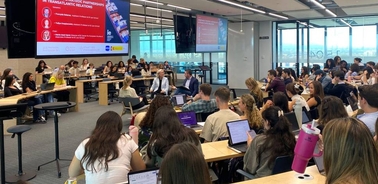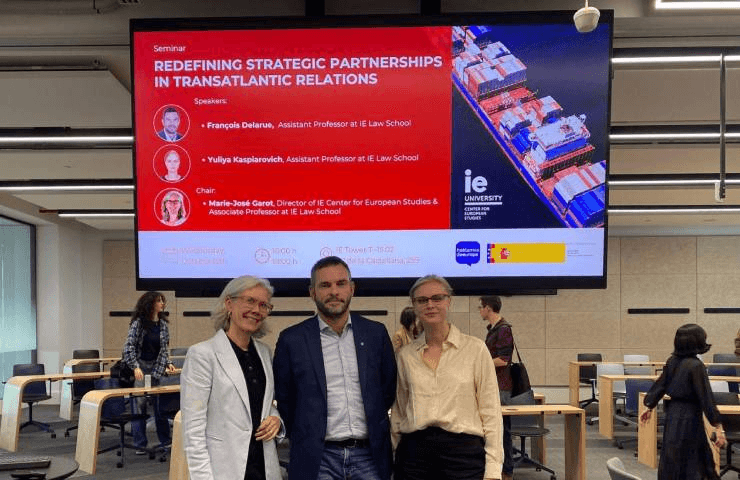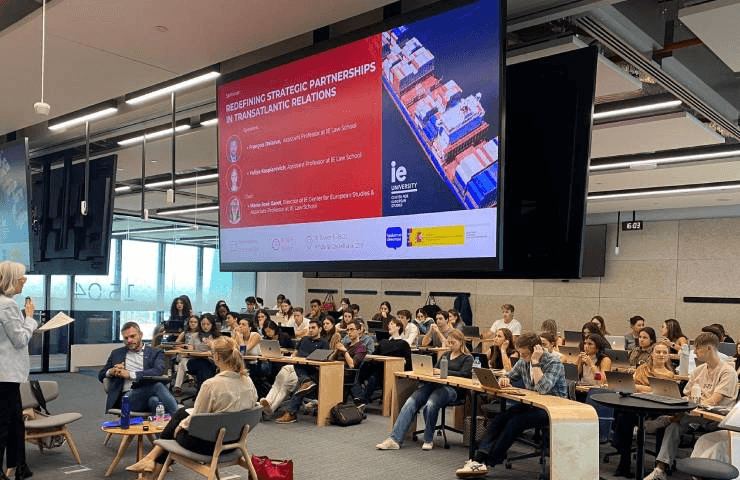- Home
- We Are Law School
- News
- Redefining Alliances: Ie Center For European Studies Examines The Future Of Transatlantic Cooperation
Redefining alliances: IE Center for European Studies examines the future of transatlantic cooperation

Experts discussed how transatlantic alliances that have held for decades are shifting in the wake of today’s unpredictable geopolitical arena.
On October 15, the IE Center for European Studies organized a seminar on “Redefining Strategic Partnerships in Transatlantic Relations”, hosted by IE Law School at IE Tower. The session explored how strategic partnerships are being reshaped within today’s global landscape.
The event was moderated by Marie-José Garot, Director of the Center and Associate Professor at IE Law School. It also featured contributions from François Delerue and Yulia Kaspiarovich, assistant professors at IE Law School. Chair Garot engaged both professors in an in-depth discussion before opening the floor to students, who raised their own questions on the topic.
The seminar began with the Chair posing questions about the challenges facing Europe and the European Union in terms of trade and partnerships in a complex geopolitical context.
Trade and defense interlinked
Throughout the seminar, Delerue and Kaspiarovich discussed how the EU needs to develop strategic autonomy to protect its identity. However, the region faces “huge limitations” in building transatlantic relations, now that the UK is no longer part of the picture. Additionally, mixed and bilateral agreements often complicate progress.
Kaspiarovich elaborated on ways in which trade and defense are interconnected. “The EU has an existential problem—anything becomes trade.” This remark emphasized that security deliberations often only take trade considerations into account, and the issues that approach can present. “When talking about trade, you talk about security; they will always be linked,” she added.
With partnerships shifting around the world and tension growing even among friends and allies, speakers looked at how Canada is rethinking its foreign relationships beyond its traditional alliance with the United States. In response to new US tariffs and tougher trade rhetoric, Canada has deepened its ties with Europe and the United Kingdom while exploring new trade routes to strengthen its strategic autonomy. “The evolution of the US approach puts things into question.” It also raises the issue of what role Canada might now play in EU defense.
Emerging actors, such as those in Latin America, were also discussed, as speakers considered frameworks that will be needed to guide these new partnerships. The notion of “trade for peace, trade for defense and how to defend trade” also came to the forefront of the conversation.
The EU’s internal struggles
A heavily focused topic was the EU’s internal procedures and the slow progress of major trade agreements. The EU-Canada Comprehensive Economic and Trade Agreement (CETA) was cited as an example of the region's internal struggles. Provisionally applied in 2017, the agreement remains unratified by all member states. If France continues to withhold approval, it remains provisional, underscoring the difficulties of taking quick, collective action.
Beyond structural challenges, Delerue spoke about how the European Union faces a deeper narrative divide when evaluating its external partnerships with allies outside the region. “We talk about the same thing, but we don’t talk in the same context. We have different versions of democracy,” he states. This observation showed the widening gap between allies, both within and outside of Europe.
Other key points of the talk zeroed in on how global realignments are prompting Europe and its partners to rethink traditional defense. During the Q&A session, students asked about internal EU challenges in adapting to a shifting geopolitical landscape, evolving US policies and a world that is moving away from globalization.
Delerue and Kaspiarovich unpacked complex ideas while reflecting on the challenges the EU and the wider world currently face as shifting partnerships lay the groundwork for a new global order.
The event, sponsored by the Spanish Ministry of Foreign Affairs, concluded with Garot thanking all participants for their time and insights before opening the post-seminar wind-down session.
About IE Center for European Studies
IE Center for European Studies is a hub for dialogue and analysis on the European Union. Opened in 2009 as a Jean Monnet Centre of Excellence, the Center furthers debate and discussion on European integration from social, legal and economic perspectives.

